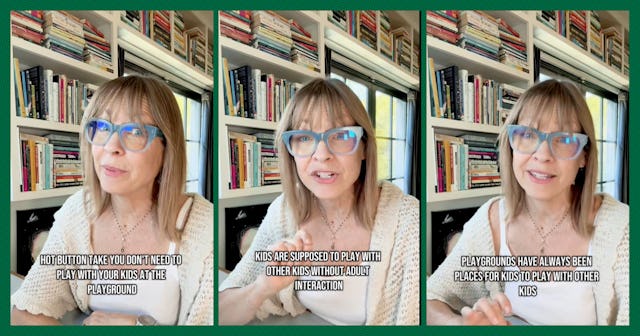No, Really, You Don't Have To Play With Your Kid At The Playground
“Playgrounds have always been places for kids to play with other kids.”

A moment that lives rent-free in my head was this time I went to the playground with my children when they were quite young — probably 5 and 3. They toddled off to do their thing and I sat down to catch up on Instagram for a bit. From somewhere a few yards away from me, I heard a scoff and turned to see an older woman talking to someone else. “It’s so sad,” she said, and it was clear she was being loud enough for me to hear her. “Parents today are so buried in their phones they’re missing their kids’ entire childhood.” I’m pretty sure in that moment I turned into the White Guy Blinking meme.
I was bemused for three main reasons. To start, I find that attitude rich coming from a woman who, by all appearances, was a Boomer. Ma’am: I was raised by your generation and I can assure you that none of you all were even going to the playground with me and my peers. We were just told to be home by the time the street lights came on. There’s plenty you missed in that time so calm down.
Secondly: I went to the playground that day because I’d been playing with my children since 6 a.m. and needed a break. And thirdly: when did children playing on their own become some sort of shame? As I said, this moment has replayed in my mind a whole lot over the years, and so I was delighted to see writer and educator Patricia Zaballos on TikTok explaining why, actually, leaving your children alone at the playground is a good idea.
“Hot button take: you don’t need to play with your kids at the playground,” she declares.
Playgrounds are the perfect place for kids to learn new social skills
“Until very recently, playgrounds have always been places for kids to play with other kids,” she explains. Not only is that convenient for you as a tired adult with bad knees and an inexplicable twinge in your back, but it’s actually good for kids to have interactions with other kids without adult involvement.
“Developmentally, it’s how they’re wired to learn the social skills they need for life: how to engage other people without alienating them, how to navigate difficult people, how to negotiate and come to consensus,” Zaballos continues. “When adults get into the mix we undermine all of this ... yes we should be nearby if help is needed, but we should be allowing our kids to develop these skills on their own.”
And seriously, think about it: when there’s an authority figure in the mix during a social interaction you have even as an adult, is the vibe the same as when she isn’t there? Probably not. You’re going to be less open with your peers and probably defer to her when it comes to decision-making. Kids are likely going to do the same. So give them a chance to spread their wings in a peers-only environment.
Playgrounds nurture independence, creativity, and confidence
Not only are kids learning how to interact with other children on a playground (if given the time and space), they’re also learning about themselves.
“Playgrounds are places where kids left alone can push themselves physically and develop a sense of adventure by doing things that are somewhat unsafe,” she says. It also helps them “build the imaginary worlds they’re supposed to build, which will help them develop into people who can envision different possibilities for themselves and the world.”
The end result is more confident, less anxious children. And beyond that...
It’s good for you, too
“The opportunity to chat and connect with other parents in real life, which is a vital aspect of parenthood that’s quickly disappearing in our modern culture,” she offers. So go ahead and take the time to talk with other adults while you’re at the playground. It can help to build community and also help you have more clarity on your own parenting ideas and philosophies by engaging with others.
In short: you don’t always have to be on as a parent/playmate. Sometimes it’s OK — advisable even! — to sit back with a book and let the kids figure things out on their own.